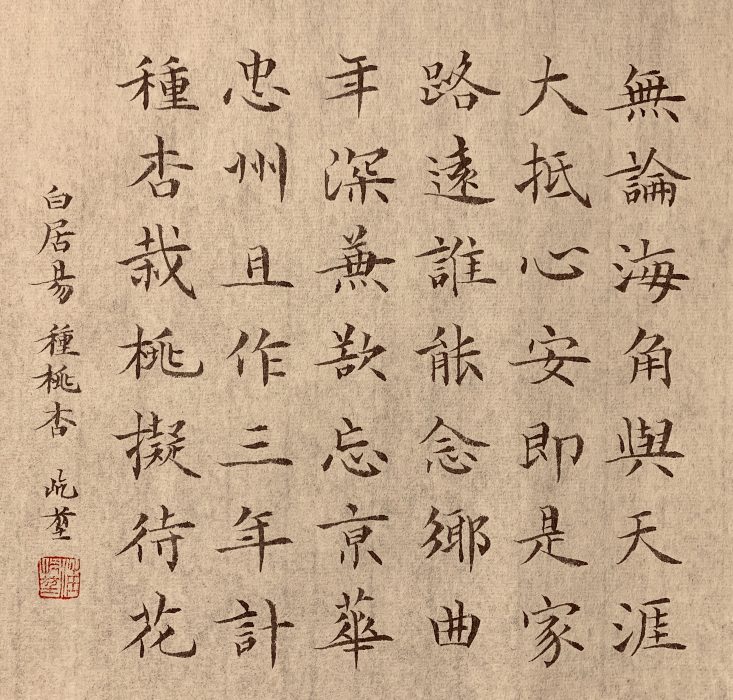
Asper master’s student excels in supply chain as transportation coordinator
Yikun Wang explains why effective teamwork goes beyond co-operation
An Asper Bachelor of Commerce (BComm) alum and current Master of Supply Chain Management and Logistics (MSCM) student, Yikun Wang [BComm(Hons)/17] is making her mark as an emerging supply chain professional and an exceptional team player.
Wang, who is also a practitioner of Chinese calligraphy and director of the Association of Chinese Calligraphers in Manitoba, understands the value of expressing her individuality and recognizing her strengths to create more productive collaborations.
She is now working as a transportation coordinator at Richardson International. She credits the MSCM’s course material, mentorship program and built-in co-op placement for her success in the role.
“The courses in the MSCM program provided industry knowledge that helped me adapt quickly to the job. The mentorship program is also super valuable! I’ve learned so much and built my soft skills thanks to my first mentor, Alexander Zlatin, and my current mentor, Brad Fulham,” she says.
In her current role, she works closely with her team while making many moving parts work together effectively and efficiently.
“In the rail department, my responsibilities include coordinating rail cars, inbound and outbound, forecasting and analyzing the inbounds across the long- and short-term while managing yard space and new crops especially during harvest,” she says.
Fortunately, Wang’s time at the Asper School of Business has prepared her for the fast-paced, multi-tasking and team-driven work of coordination.
“The MSCM Program also advocates teamwork and cultivates our cooperation skills. This has been one of the most impressive parts of my Asper experience and has helped me integrate into my current team seamlessly,” she explains. “The courses are purposefully designed around teamwork, so they also worked as a strong base to prepare us for case competitions.”
Wang signed up for a competition after a classmate suggested it and gave her only one night to apply. The decision paid off, as Wang and her team became gold medalists at the 2023 APICS London and District Case Competition and have experienced continued success since.
In teams across Asper, Wang learned how these group efforts really work.
“Teamwork is not simply about co-operation, but also about identifying what each of us brings to the project. It is about contributing your strengths to the group and finding the best way to make those strengths work together,” she says.
At Asper, Wang worked with Narendra Malalgoda, assistant professor of supply chain management at Asper, as a research assistant and case participant. Malalgoda comments on how her approach to teamwork always elevated her team.
“I must say that Yikun truly stood out as an exceptional student. Her ability to work effectively within a team was remarkable, as she not only contributed her own insights and expertise but also went above and beyond to support her teammates and help them excel,” he says.
Wang’s approach to teamwork embraces but also goes above and beyond the idea that the whole is greater than the sum of its parts, and her definition of teamwork explains why collaboration is more than effective, it’s necessary.

Chinese calligraphy by Yikun Wang
As Wang describes it, teamwork creates conditions for optimizing our own capabilities by requiring that we support and be supported in turn, improving on weaknesses and continuously learning through collaboration.
In all her work, Wang understands how every team member brings something new to what is familiar. “A calligrapher’s handwriting expresses their personality,” she says.
Today at Richardson, Wang is leveraging her personality, her strengths and the support of her team to see current supply chain challenges as opportunities, rather than problems.
“These challenges are a bit like a double-edged sword,” she says. “It depends on how companies approach and control them. The COVID-19 pandemic affected the whole global supply chain, and we felt how vulnerable it is. This realization prompted supply chain professionals to rethink sourcing and planning strategies, as well as how we adopt technology and approach sustainability.”
As an emerging supply chain expert, Wang is ready to rethink previous systems, confront new challenges and leave her unique mark in a dynamic and crucial field.






